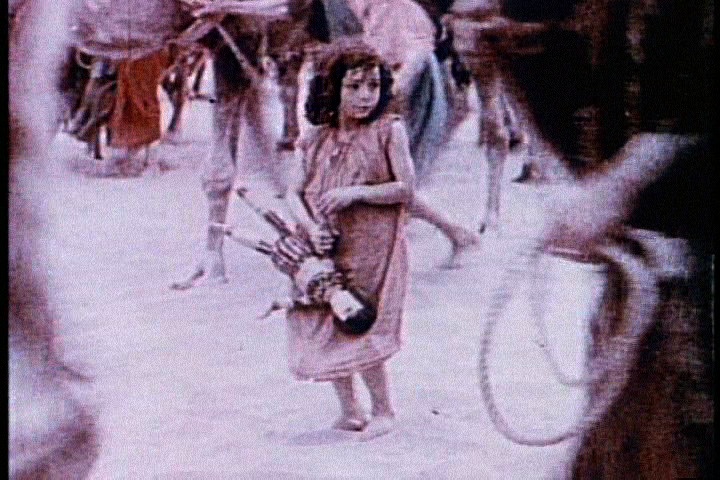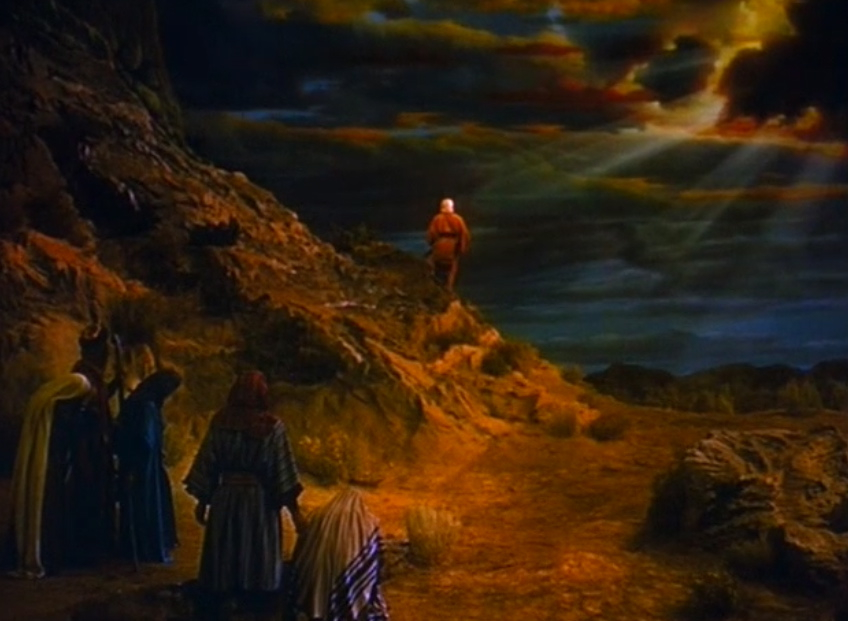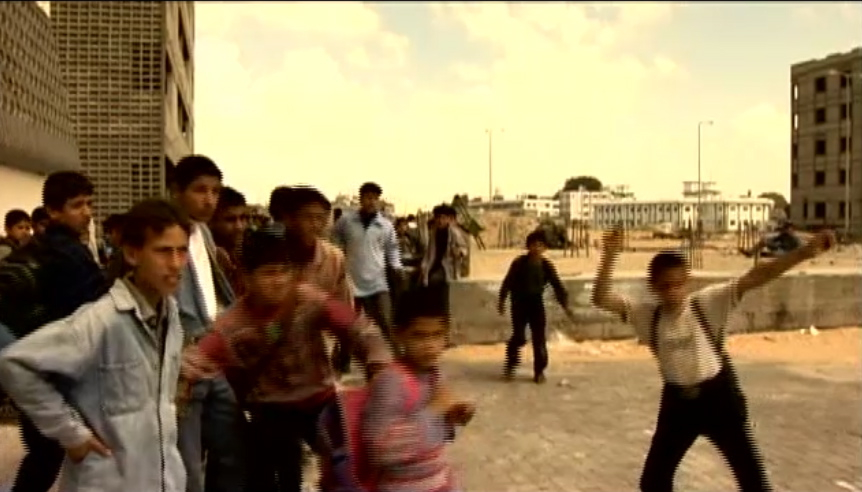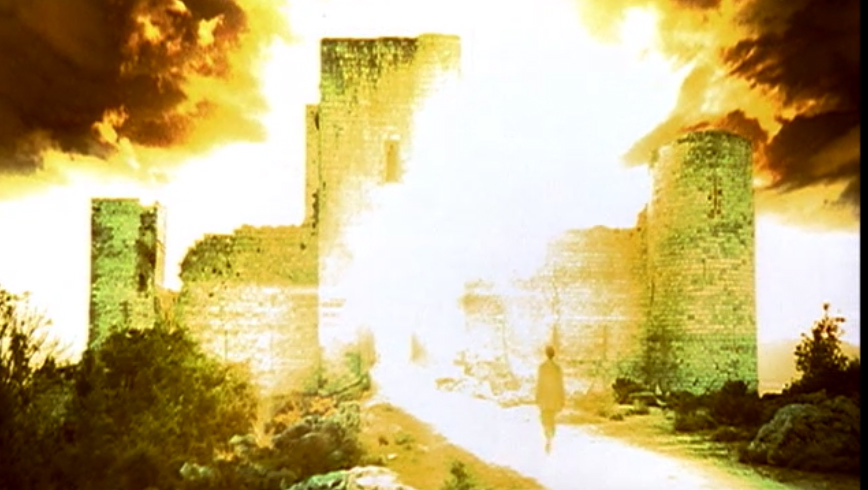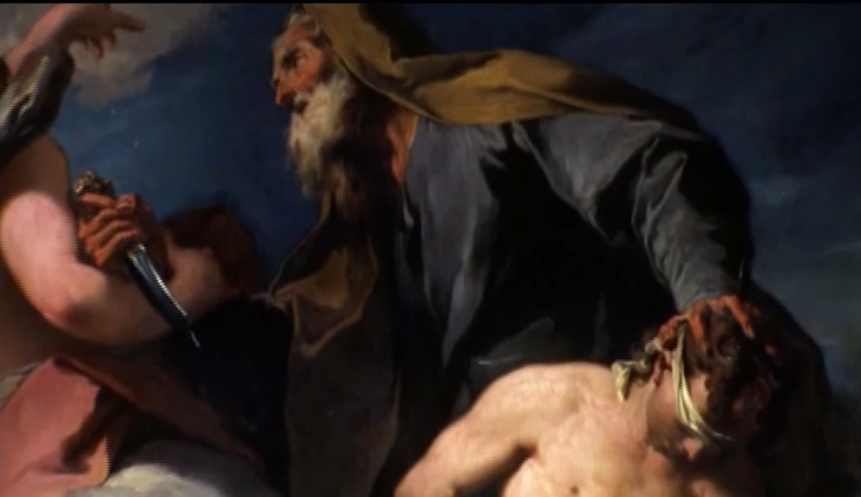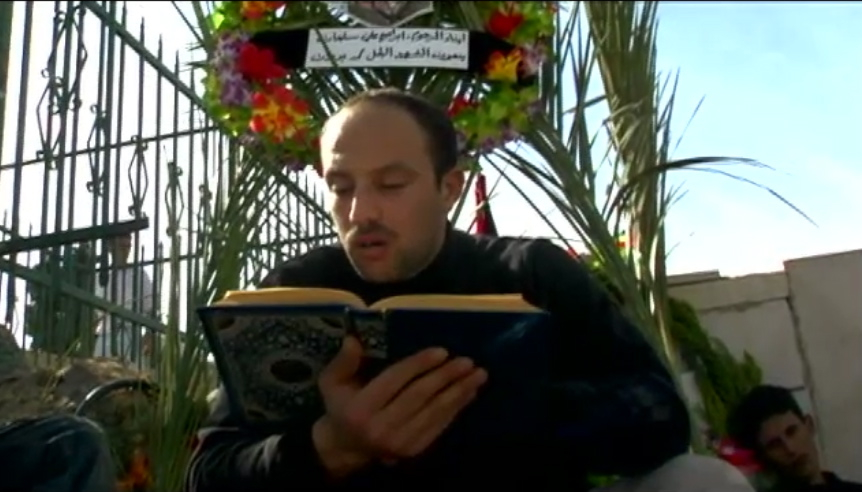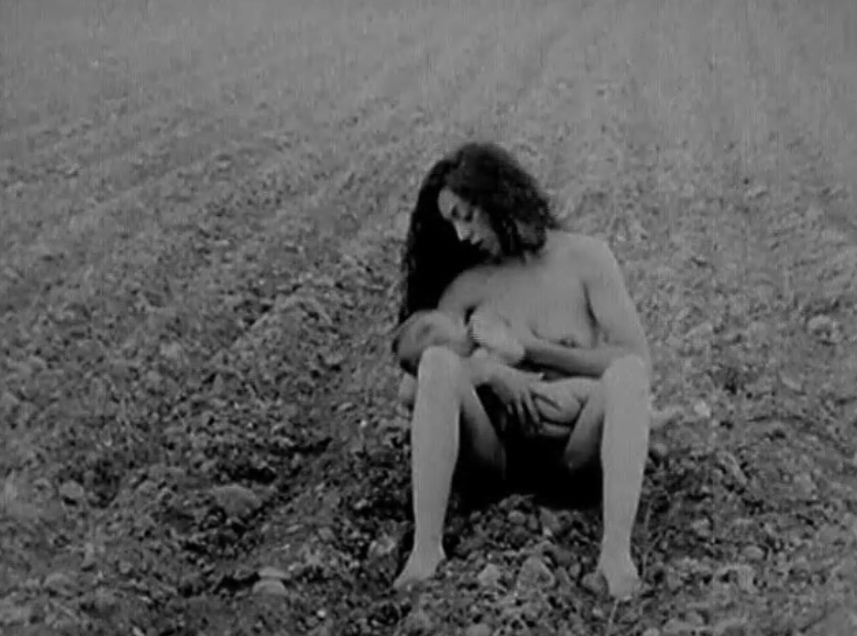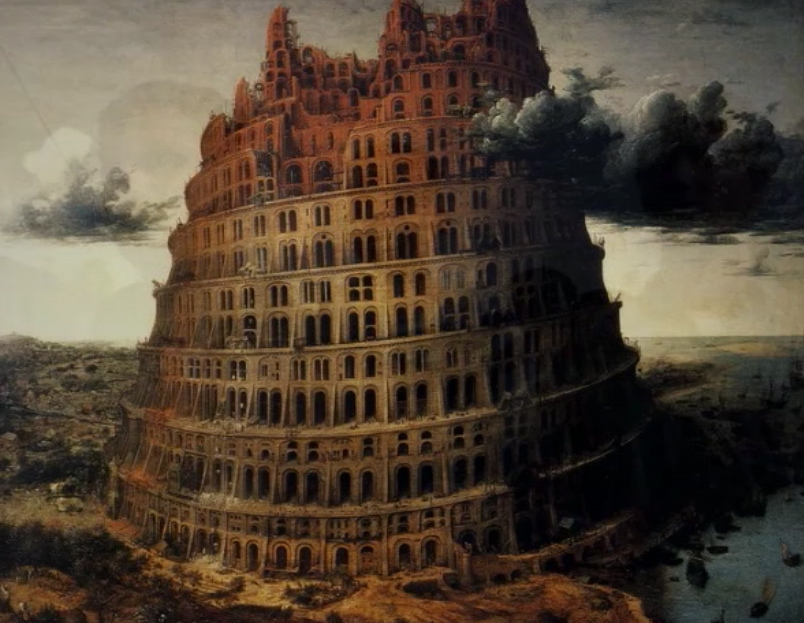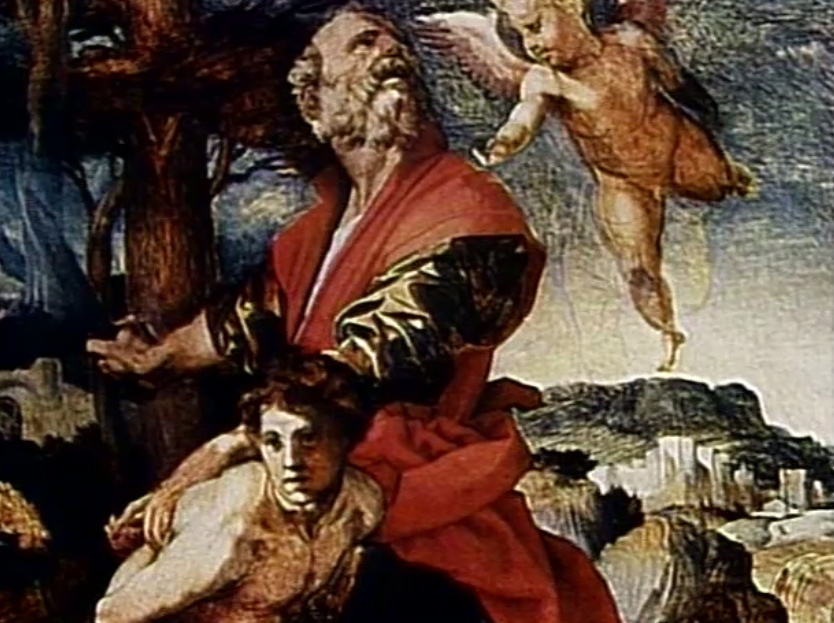Part of Fall 2012
Fresh from screenings in Vienna, Jihlava, Montreal and Paris, Pleasure Dome presents the Toronto premiere of Mike Hoolboom’s new feature length essay Lacan Palestine (70 min., 2012)
By adding his distinctive voice to the growing number of artists engaging with the subject of Palestine, Hoolboom skillfully crafts an essay film that collages newsreels, documentary interviews and Hollywood fabulations. As Zionist narratives of Palestine continue to be replayed in the corporate media, it is increasingly important to turn to counter-narratives of resistance. Hoolboom carefully complicates this record, replaying Palestine as the site of imperial projection and ghost protocols. Through an intricate analysis of the role of the father and the question of naming, Lacan Palestine offers an opulent collage that places the still-fledgling nation-state at the crossroads of psychoanalysis and permanent war.
Grand Prize Winner at the 2012 Festival International Signes de Nuit
“The grand prize goes to Lacan Palestine for its immersion in a complex subject that arrives via a montage that is subtle, sensitive and strong. Its great visual richness emerges from impressive iconographic research. In spite of its diversity of images, this fluid work carries an insistent theme of personal history that makes us identify with a fate or destiny, creating a persistent, high wire hum.” Festival International Signes de Nuit grand prize jury statement
Toronto/Mike Hoolboom’s Lacan Palestine by Terence Dick (Akimblog, November 27, 2012)
There was a time when I would pontificate on the theories of Jacques Lacan with as much confidence as I muster these days for my views on the Middle East. But truth be told, I remain at a loss to understand either in any but the most superficial way. I know the key terms (mirror stage, blockade) and people I respect (Slavoj Zizek, Naomi Klein) say things I think I agree with, but the unresolved complexity of each leaves me hesitant to define one or the other, to make a judgment or put a name to what either of them really mean.
While I’ve given up on Lacan for the time being, I spend a lot of time trying to get to the bottom of things in the Middle East, following the conflicts, reading up on both sides of the issue, and, in general, criticizing Israel for its continuing mistreatment of the Palestinians. But all the standard sources for evidence lead endlessly through interpretations of historical precedent that expand concentrically from Jerusalem to engulf the globe. And I remain uncertain in what I know. It was with this twin doubt that I attended Pleasure Dome’s screening of Mike Hoolboom’s new film Lacan Palestine at Beit Zatoun House in Toronto last Saturday. The gathered audience could best be described by a Venn diagram of artists and activists. I stood at the back of the packed room and shifted from foot to foot as Hoolboom’s torrent of images – some documentary, some found footage, some abstract – churned beneath an equally indirect narrative of fragmented voices hinting at the meaning of the material but never landing a definite statement. But that was the point. Rather than resolve things, he condensed years of news and accumulated media in a seventy minute frame. He told the audience off the top not to bother parsing every single image in relation to every other, but to surrender to the flow and allow their eyes to decide what to focus on (a thread of the film, referencing Barthes’ punctum, deals with this manner of looking). The result, rather than saying, “this is that”, dredges up the unconscious of Said’s Orient and, like all powerful political art, encourages us to ask the same old questions, so familiar that we barely register how rote our responses have become, once again. Some of these questions seem simple – like, “How do neighbours get along?” – other seems complex – like, “How did this happen?” But Hoolboom, who, like myself, has never been to the Middle East, makes his contribution to the discussion by assembling an experience that demands a response – at the least, to make sense of what was seen, but ideally to elicit different ways to consider the situation. However, a single screening is not enough. This film, as dense with images and ideas as it is, requires multiple viewings to see the many echoes and repetitions that pull together its cyclical structure. I’m not so naïve as to think I’ll find my answers there, but at least I have a site to exorcise my confusion.
Mike Hoolboom, Lacan Palestine
“While I’ve given up on Lacan for the time being, I spend a lot of time trying to get to the bottom of things in the Middle East, following the conflicts, reading up on both sides of the issue, and, in general, criticizing Israel for its continuing mistreatment of the Palestinians. But all the standard sources for evidence lead endlessly through interpretations of historical precedent than expand concentrically from Jerusalem to engulf the globe. And I remain uncertain in what I know.
It was with this twin doubt that I attended Pleasure Dome’s screening of Mike Hoolboom’s new film Lacan Palestine at Beit Zatoun House in Toronto last Saturday. The gathered audience could best be described by a Venn diagram of artists and activists. I stood at the back of the packed room and shifted from foot to foot as Hoolboom’s torrent of images – some documentary, some found footage, some abstract – churned beneath an equally indirect narrative of fragmented voices hinting at the meaning of the material but never landing a definite statement. But that was the point. Rather than resolve things for me, he condensed years of news and accumulated media in a seventy minute frame. Hoolboom told the audience off the top not to bother parsing every single image in relation to every other, but to surrender to the flow and allow their eyes to decide what to focus on (a thread of the film, referencing Barthes’ punctum, deals with this manner of looking). The result, rather than saying, “this is that”, dredges up the unconscious of Said’s Orient and, like all powerful political art, encourages us to ask familiar questions again. Some of these questions seem simple – like, “How do neighbours get along?” – other seems complex – like, “How did this happen?” But Hoolboom, who, like myself, has never been to the Middle East, has made a contribution to the discussion and, in his own challenging way, demands a response. However, a single screening is not enough. This film, as dense with images and ideas as it is, requires multiple viewings to see the many echoes and repetitions that pull together its cyclical structure. I’m not so naïve as to think I’ll find my answers there, but at least I’m not alone in my confusion.”
“A mind boggling achievement by Canadian artist Mike Hoolboom, who has been called ‘the greatest found-footage master of the era.’ Skilfully assembled from existing film material, Hoolboom conjures visual allegories and cut-up counter-narratives around a notion of Palestine as “a land that is not a land.” Dizzying in its technical and conceptual density, Lacan Palestine is truly incomparable cinema.” (Nick Denes, London Palestine Film Festival)
“This beautiful experiment is as noble as it is absurd, the intractable struggle continues, and in the midst of this fine searching a single certitude emerges. We are really in front of something that we can call cinema. Its striking intelligence and sudden illuminations confront us with a singular and authentic cinema. In the acrobatic editing, in Hoolboom’s control from the beginning of the film to the end, there is something shining, urgent, burning. There is a nearly blinding dimension to this accumulation of fragments that impels the viewer to re-see the movie as soon as it is finished. To observe again its folding parts, to find the hidden meanings, to meditate again and again on its implications.” (Describing the Indescribable by Marcel Jean, 24 Images, no. 159, Oct/Nov 2012)
“Put all the images in language in a place of safety and make use of them, for they are in the desert, and it’s in the desert we must go and look for them.” Jean Genet
“Palestine is like the cinema: it’s searching for independence.” Godard
“The term essay film is sometimes used a bit too easily, but this really is one – and it isn’t an easy one. Skillfully cut and pasted from existing film material, the film provides a complex picture of Palestine. The land that is not a land, but does have inhabitants. An improbable place for love.
The foundation of Palestine has a long and difficult history, characterized by a continuing battle for the right to exist. In this cinematographic essay, entirely composed of found-footage material, the history of a land without land is sketched, with its painful relationship with its neighbour Israel. Epic scenes from features, iconic news footage of historic moments, the ever-changing map of Israel, video art by Velcrow Ripper, Elle Flanders and Dani Leventhal, but also very personal recordings of everyday survival, are linked together by the psychoanalytic reflections of filmmaker Mike Cartmell, based on his own painful personal history. From his background as an adopted child, he wonders when you become someone, and how society can emerge from individuals; he compares the functioning of a complex society with that of John Coltrane’s jazz combo, in which even five super-egos managed to achieve harmony. In Mike Hoolboom’s view of Palestine, love and violence exist side-by-side, as a matter of course.” (Gertjan Zuilhof, International Film Festival Rotterdam)
Lacan Palestine is a found footage essay about the troubled couple of Palestine. This country without a country has been party to imperial projections for centuries, amply on display here as waves of armed crusaders, legionnaires, Mongols on horseback and biplanes issuing state edicts from the end of a machine gun. There are maps by the galore, drawn and redrawn as occupied territories are bartered in foreign capitals. Contemporary art activists Velcrow Ripper, Elle Flanders, Tamira Sawatzky, Dani Leventhal and others have generously donated their keen lookings and these have been swabbed with newsreels, desert spectaculars, historical recreations and intimate encounters. Mike Cartmell appears as the ghost of psychoanalysis, offering ruminations on killing the father, John Coltrane and why enjoyment is difficult. But never mind the critical mass, the heart of the movie remains its extended lyrical passages that collage a dizzying suite of couples – embracing, loving, hurting. A loveless love story starring Moses, Abraham and Jacques Lacan.
“Palestine is often described as a place that defies description, and for all the endless footage, a place that cannot be seen. Palestine lies between the imaginary and the real hence ‘imaging Palestine’ becomes perhaps one of the greatest cinematic and political challenges. Who better to take up this challenge than Toronto’s master experimental filmmaker Mike Hoolboom? The fragments that comprise Lacan Palestine are both the public and private languages that interpolate the symbolic sphere that constitute the history of Palestine and therefore the history of the Israel into being. As both a good analyst and a good filmmaker would know, originary myths uncover what lies at the heart of an ongoing conflict. And so Hoolboom takes us through these myths, dreams and canonical cinematic placeholders, presenting us Palestine in fragments—perhaps the only way to tell the story of what may be Palestine.
Hoolboom takes the name the father as a starting point, wherein the subject (here Palestine) comes into being through the law (Israel) and rifles through the deep psychoanalytic rift whose symptom is contemporary Palestine.” (Elle Flanders)
Mike Hoolboom is a Canadian artist working in film and video. He has made over fifty films and videos, though most have been withdrawn from circulation, approximately a dozen remain on view. His work has appeared in over four hundred festivals, garnering thirty awards. He has been granted the Tom Berner Award for community service and two lifetime achievement awards, the first from the city of Toronto, and the second from the Mediawave Festival in Hungary.
He has enjoyed retrospectives of his work at the Images Festival (Toronto), Visions du Reel (Switzerland), Cork International Festival (Ireland), Cinema de Balie (Amsterdam), Mediawave Festival (Hungary), Impakt Festival (Holland), Vila do Conde Festival (Portugal), Jihlava Documentary Festival (Czech Republic), Stuttgarter Filmwinter (Germany), Musée des Beaux-Arts de Caen (France), Sixpack Film (Vienna), the Buenos Aires International Festival (Argentina), and A Million Different Loves Festival in Poland.
He is a founding member of the Pleasure Dome screening collective and has worked as the artistic director of the Images Festival and as the experimental film co-ordinator at Canadian Filmmakers Distribution Centre.
Mike Hoolboom has published a pair of interview books with Canadian media artists, Practical Dreamers: Conversations with Media Artists (Coach House Press, 2008) and Inside the Pleasure Dome: Fringe Film in Canada (Coach House Press, 2001). He has edited or co-edited books on Frank Cole, Barbara Sternberg and Philip Hoffman, in addition to publishing electronic books on Deirdre Logue, Dani Leventhal, Al Razutis, Mike Cartmell, Steve Reinke, American Fringe Movies and the Documentary. In 1998 he authored Plague Years (YYZ Books) a tongue-in-chic autobiography. His first novel The Steve Machine was published by Coach House Press in the fall of 2008. He has published more than one hundred articles on fringe media which have appeared in magazines and catalogues around the world.
Since 2004 he has been working on Fringe Online (www.fringeonline.ca ), a web project which makes available the archives of 40 Canadian media artists. This ongoing project currently consists of hundreds of pages of transcripts, reviews, interviews and scripts, and remains the largest publishing project in the Canadian fringe media sector.
